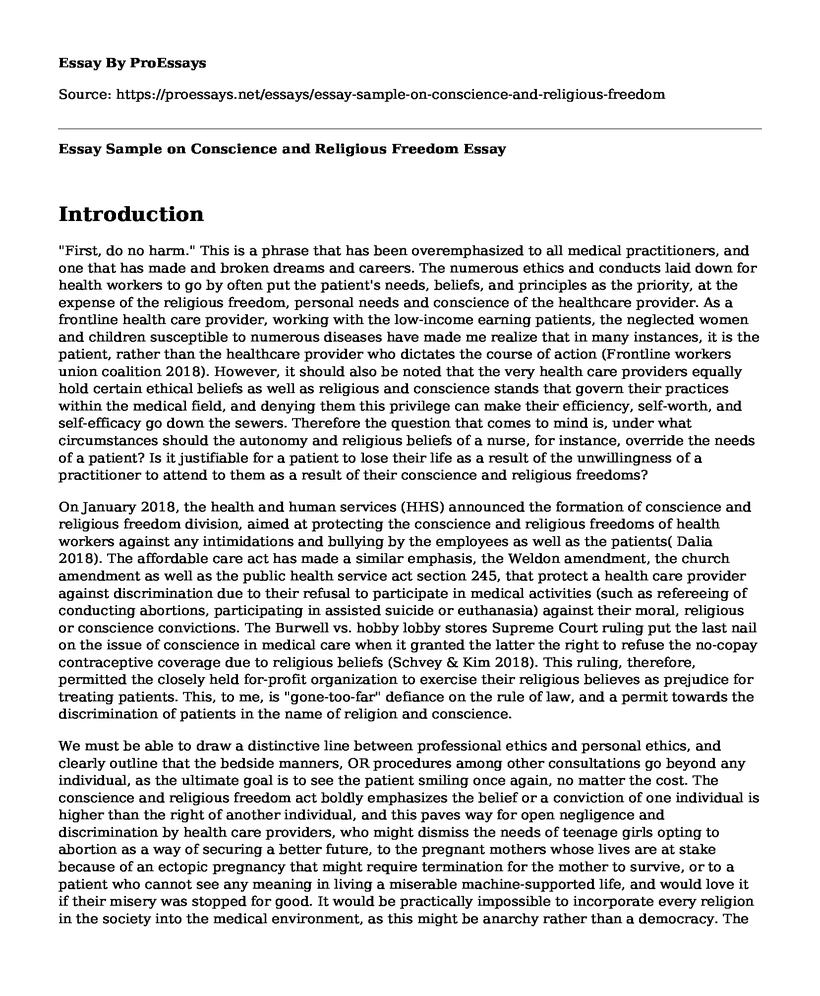Introduction
"First, do no harm." This is a phrase that has been overemphasized to all medical practitioners, and one that has made and broken dreams and careers. The numerous ethics and conducts laid down for health workers to go by often put the patient's needs, beliefs, and principles as the priority, at the expense of the religious freedom, personal needs and conscience of the healthcare provider. As a frontline health care provider, working with the low-income earning patients, the neglected women and children susceptible to numerous diseases have made me realize that in many instances, it is the patient, rather than the healthcare provider who dictates the course of action (Frontline workers union coalition 2018). However, it should also be noted that the very health care providers equally hold certain ethical beliefs as well as religious and conscience stands that govern their practices within the medical field, and denying them this privilege can make their efficiency, self-worth, and self-efficacy go down the sewers. Therefore the question that comes to mind is, under what circumstances should the autonomy and religious beliefs of a nurse, for instance, override the needs of a patient? Is it justifiable for a patient to lose their life as a result of the unwillingness of a practitioner to attend to them as a result of their conscience and religious freedoms?
On January 2018, the health and human services (HHS) announced the formation of conscience and religious freedom division, aimed at protecting the conscience and religious freedoms of health workers against any intimidations and bullying by the employees as well as the patients( Dalia 2018). The affordable care act has made a similar emphasis, the Weldon amendment, the church amendment as well as the public health service act section 245, that protect a health care provider against discrimination due to their refusal to participate in medical activities (such as refereeing of conducting abortions, participating in assisted suicide or euthanasia) against their moral, religious or conscience convictions. The Burwell vs. hobby lobby stores Supreme Court ruling put the last nail on the issue of conscience in medical care when it granted the latter the right to refuse the no-copay contraceptive coverage due to religious beliefs (Schvey & Kim 2018). This ruling, therefore, permitted the closely held for-profit organization to exercise their religious believes as prejudice for treating patients. This, to me, is "gone-too-far" defiance on the rule of law, and a permit towards the discrimination of patients in the name of religion and conscience.
We must be able to draw a distinctive line between professional ethics and personal ethics, and clearly outline that the bedside manners, OR procedures among other consultations go beyond any individual, as the ultimate goal is to see the patient smiling once again, no matter the cost. The conscience and religious freedom act boldly emphasizes the belief or a conviction of one individual is higher than the right of another individual, and this paves way for open negligence and discrimination by health care providers, who might dismiss the needs of teenage girls opting to abortion as a way of securing a better future, to the pregnant mothers whose lives are at stake because of an ectopic pregnancy that might require termination for the mother to survive, or to a patient who cannot see any meaning in living a miserable machine-supported life, and would love it if their misery was stopped for good. It would be practically impossible to incorporate every religion in the society into the medical environment, as this might be anarchy rather than a democracy. The United States Constitution in itself proves that religion can never be taken as a monolithic issue when it contradicts itself by denying any alteration on the laws as a result of religion while emphasizing that no citizen should be discriminated against thereof.
Conclusion
Faced with an ectopically pregnant woman, the conscience and religious freedom act permits a nurse for instance to refrain from attending to this patient because of their religious beliefs, and the patient will die, or they could opt to overlook their religion and focus on their professional ethics and their duty of care and save the woman at the expense of the unborn baby. Therefore, instead of overemphasizing one aspect of the diverse medical ethical field, while inflicting on the others, the professional within this ovdi6ield should take each medical scenario with the autonomy it deserves. Any health care provider relinquished their personal privileges once they entered into the medical profession, and therefore, there should never be an instance where the medical needs of patients are overlooked due to the personal ethics or religious beliefs.
References
Schvey A. A. &Kim C. (2018). Unconscionable: how the U.S. Supreme Court's jurisprudence lags behind the world when it comes to contraception and conscience. https://www.ncbi.nlm.nih.gov/pmc/articles/PMC5859490/
Dalia S. (2018). HHS Division to Enforce 'Conscience and Religious Freedom'. American Journal of Nursing. Volume 118 - Issue 4 - p 12. doi: 10.1097/01.NAJ.0000532053.89405.82
Frontline workers union coalition (2018). Who are they? https://www.frontlinehealthworkers.org/who-they-are
Cite this page
Essay Sample on Conscience and Religious Freedom. (2022, Jul 15). Retrieved from https://proessays.net/essays/essay-sample-on-conscience-and-religious-freedom
If you are the original author of this essay and no longer wish to have it published on the ProEssays website, please click below to request its removal:
- Research Paper on Dementia Disease State
- A Holistic Approach to Mindful Mediation and Exercise in African American Woman
- Opioid Abuse and Addiction: Evaluating Prevention and Health Programs - Essay Sample
- Bariatric Surgery: Benefits and Drawbacks - Research Paper
- The Book of Amos: Ancient Prophecy & Posthumous Editing - Essay Sample
- Essay on Dynamic Macronutrient Approach: A Nutrition Expert's Tool for Individualized Eating
- Free Report on Culture Competence: Essential for Quality Nursing Practice







